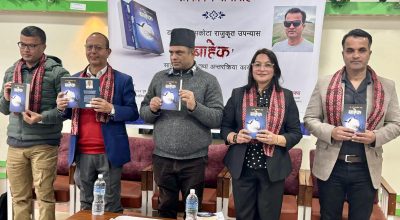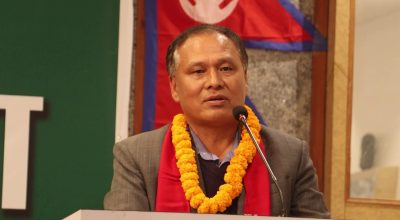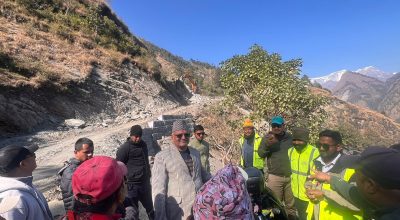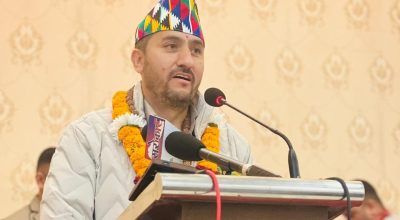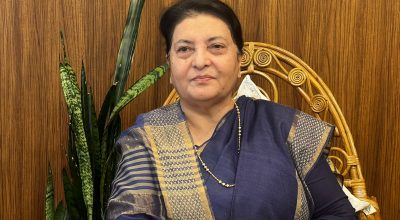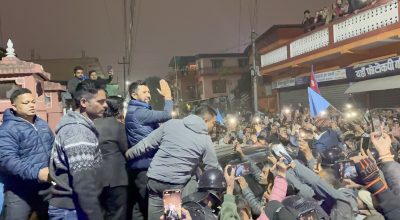
Chandrakala Bhandari
Jhapa, April 10: In the face of perennial problems created by a shortage of chemical fertilizers, farmers of Jhapa have come up with a way out. They have launched a campaign to use organic fertilizer at the people’s level as an alternative. They have adopted the ‘waste decomposer’ developed by agriculture scientist Dr Krishna Chandra from India to produce compost, said Bhim Kunwar, operator of the local Sungava Organic Agriculture Farm at Bhadrapur-10 in Jhapa district.
The use of compost manure aims to increase soil productivity, reduce the use of chemical fertilizers and free agricultural produce of pesticides, he said. “It has been too late to seek an alternative to chemical fertilizers. The government should encourage the making of compost through our own resources,” he said.
The ‘best composer’ is a technology through which there can be an organic agriculture revolution, and it also helps stop the outflow of millions of rupees from the country in the purchase of chemical fertilizers, according to him. Despite negative impacts from the use of chemical fertilizers, its use is increasing in the country, it has been reported. Its excessive use can reduce soil productivity, said the people advocating the use of organic fertilizers.
“Excessive use of chemical fertilizers is harmful to soil. The best way to replace is the use of composts,” argued Kunwar. Waste decomposer is a bio-control, bio-fertilizer, bio-pesticide and soil health reviver developed in the National Centre of Organic Farming in India by Dr Chandra.
It is prepared from cow dung, and acts as a quick decomposer of waste compounds in the soil, said Kunwar. It is a combination of few beneficial microorganisms produced from cow dung. Aside from producing anti-microbial secondary metabolites, the microorganisms which let out metabolites that are a harbinger of antimicrobial compounds.
These antibacterial microbes in the soil and plants control and prevent diseases. They also produce glucanase and B-1, 3 glucanase enzymes that helps to improve defence mechanisms of the plants.
One can make this solution by abiding by the following steps:
Fill a plastic drum with a mixture of 200 litres of water and 2 kg jiggery.
Pour a bottle of waste decomposer in the water drum and stir the mixture with a wooden stick. Cover the drum properly with plastic or wooden materials and leave it until five days. Stir the mixture twice in a day for five minutes. The solution will turn creamy after five days, and after seven days, it will be ready for use. The solution amounting to 200 litres can be sprayed in a kaththa land, he said.
As a campaigner to promote the use of organic fertilizers, Kunwar spent a long period of his life in a jail for speaking up against the Panchayat regime. He has now actively engaged in agriculture farming.
He has grown many varieties of vegetables in his farm. Farmers from the district, and Ilam, Dhankuta, Morang and Panchthar districts have visited his farm to purchase liquid waste decomposer solution. He also provided training to many farmers under the projects launched by the Agriculture Knowledge Centre, Jhapa, and the NMC Namuna Krisi Farm.
Kamal Rural Municipality produces ‘Kamal Mal’
Kamal Rural Municipality has been encouraging farmers to use biodegradable fertilizers prepared through the waste decomposer. The fertilizers prepared through the technology ‘Kamal Mal’ by the rural municipality has been named as ‘Kamal Mal’.
The rural municipality has produced the fertilizers and has been distributing them to farmers for free since 2076 BS, said Mahendra Bohora, chief of the agriculture branch, the rural municipality.
He said he was more than happy to have utilised the skills he learned from training in India to prepare composts through the technology. It last year distributed 100 liters organic fertilizers to the farmers at its all seven wards.
The organic fertilizers produced by the rural municipality were tested four times effective than other fertilizers, he said. “Farmers have been attracted to them after they were tested much effective than other fertilizers. We want to provide them to all farmers of the rural municipality,” he said. Approximately 150 farmers of the rural municipality have been using the fertilizers since three years, and the number is expected to increase in the days to come, said Raj Kumar Shakya, chief administrative officer at the rural municipality. The rural municipality has operated industries to produce the fertilizers in two places.
Farmers satisfied
Farmers are satisfied with the effectiveness of the fertilizers. Our agricultural production has increased through the use of the fertilizers, they said. The government should prioritise the production and use of organic fertilizers by replacing chemical ones, they suggested.
Dilli Khatiwada of Mechinagar-14 knew about the waste decomposer through YouTube three years back. “It has been three years since I started organic farming. Rampant use of chemical fertilizers has damaged the soil. Bacteria in the waste decomposer helps treat the damaged soil and make it fertile,” said Khatiwada, who runs an agriculture farm in the locality.
He accused the government of being negligent in promoting organic fertilizers under the influence of the traders of chemical fertilizers. “We are finding composts as an alternative to chemical fertilizers. But, the state is ignorant.”
Manjul Meche of Mechinagar-12 has been also using biodegradable fertilizers made through this technology in his agriculture farm. He runs an agriculture farm spanning two bighas of land, and with the use of the fertilizers, his production has increased. A tomato tree he grew produced up to 15 kg tomato in a season.
“I would use chemical fertilizers. When I started using the fertilizers made through the technique, my produce has increased double fold,” he said. [Translated by Pritam Bhattarai] (RSS)






